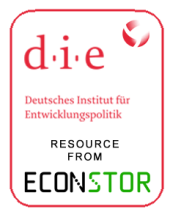/ library resources
Showing items 1 through 9 of 182.This Strategic Plan to be implemented during a period from 2017 to 2021 is all about a contribution of WWF Mongolia towards successful and thriving co-existenc
In 2015 the global community committed itself to an ambitious programme of reform. Achieving the Sustainable Development Goals and implementing the resolutions of the Paris climate conference require that great efforts are made – including those of a financial nature.
In this article the author has aimed a study on F.A.O. regarding historical aspects of formation F.A.O. as a specialized agency of the UN, analysis directions of its activity, its main functions etc. The author also aims to examine specific issues related to cooperation between F.A.O.
The paper analyzes the provision with spatial information and the mode of its use in rural municipalities. The purpose of this study is to examine the ensurance with spatial information about natural capital within the ATU.
This journal article discusses the importance of empowering grassroots community to facilitate the sharing of climate change and REDD+ related information, knowledge and policies discussed at the national, regional and global level to local stakeholders.
This poster is a summary of approaches and activities of the Grassroots Capacity Building for REDD+ in Asia project that are implemented in five countries: Indonesia, Lao PDR, Myanmar, Nepal and Viet Nam.
This brief presents an integrated CF-CCA framework for practitioners working in rural contexts, including natural resource management user groups and non-governmental and civil society organizations. The framework draws on an integrated landscape approach (Reed et al.
REDD+ scheme is primarily aimed at national governments and local forest managers to reduce emissions by conserving forests; at the same time, increasing investment on capacity developmen for grassroots stakeholders who are the main forest stewards provides opportunities for the grassroots actors
Based on empirical case studies in four countries in South (Nepal) and Southeast Asia (Cambodia, Myanmar and Viet Nam), this issue paper examines how REDD+ can be a driver of conflict (and cooperation), particularly between forest communities, governments and REDD+ project developers, as well as
Paginering
Land Library Search
Through our robust search engine, you can search for any item of the over 73,000 highly curated resources in the Land Library.
If you would like to find an overview of what is possible, feel free to peruse the Search Guide.








